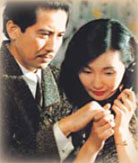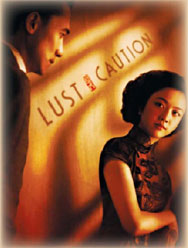It is only fitting that Eileen Chang should be a favorite with filmmakers across generations. Among her early works were film reviews for an English-language newspaper in Shanghai. She showed great promise as a scriptwriter and ended up leaving a couple of gems in her literary legacy that were specifically for the big screen.
Her stories and novels have a heightened sensibility toward anything visual or sensory but most film adaptations have failed to capture her exquisite essence.
Unending Love (1947) (不了情)
It starred China's Brad and Angelina of the day but fell flat nonetheless. The acting was so stilted it gives you goose bumps and the story smacks of a stereotypical urban romance.
Long Live My Wife (1947) (太太万岁)
Almost miraculously, this second partnership between Chang and director Sang Hu, who reportedly had his eyes on the gifted writer during the production, has proved to be one of the best comedies in Chinese film history. The battle of the sexes and the family dynamics are so accurately and playfully depicted that it hasn't lost an iota of relevance. Standouts are the great Shi Hui and Shangguan Yunzhu in supporting roles.
The Battle of Love (1957) (情场如战场)
A Tale of Two Wives (1958) (人财两得)
The Wayward Husband (1959) (桃花运)
The June Bride (1960) (六月新娘)
The Greatest Wedding on Earth (1962) (南北一家亲)
Father Takes a Bride (1963) (小儿女)
Please Remember Me (1964) (一曲难忘)
The Greatest Love Affair on Earth (1964) (南北喜相逢)
The revival of Chang's scriptwriting career in Hong Kong produced this series of witty comedies, which showcase her talent for straddling the urban high-brow and low-brow. All of the films were produced by Stephen Soong, whose friendship with Chang sustained her psychologically for the rest of her life.
Love in a Fallen City (1984) (倾城之恋)
Ann Hui's adaptation of Chang's nouvelle, about a pair who tangoed with each other in Hong Kong when the city was besieged by the Japanese, is competent but lacks an authentic flavor.
 Rouge of the North (1988) (怨女, adapted from The Golden Cangue)
Rouge of the North (1988) (怨女, adapted from The Golden Cangue)
The Golden Cangue is one of Chang's best works but the film version is mediocre at best.
Red Dust (1990) (滚滚红尘, pictured left)
This thinly veiled biopic sides with the male side, thus glossing over Hu Lancheng's dark side.
Red Rose White Rose (1994) (红玫瑰白玫瑰)
Another faithful adaptation that fails to convey the rich shades of Chang's world. Joan Chen delivers a bravura performance.
Eighteen Springs (1997) (半生缘)
Ann Hui's second outing as an adapter of Chang's writing fares little better. At best, it serves as an introduction to her writing but Anita Mui is memorable as the elder sister with a complicated personality.
Lust, Caution (2007) (pictured right)
Ang Lee's foray into Chang territory made a huge splash. The political implications may have been controversial but artistically it comes the closest to recreating Chang's world, with meticulous attention and fearless acting. Its subtlety and nuances are simply too much, however, for those not versed in Chinese literature.
(China Daily March 24, 2009)